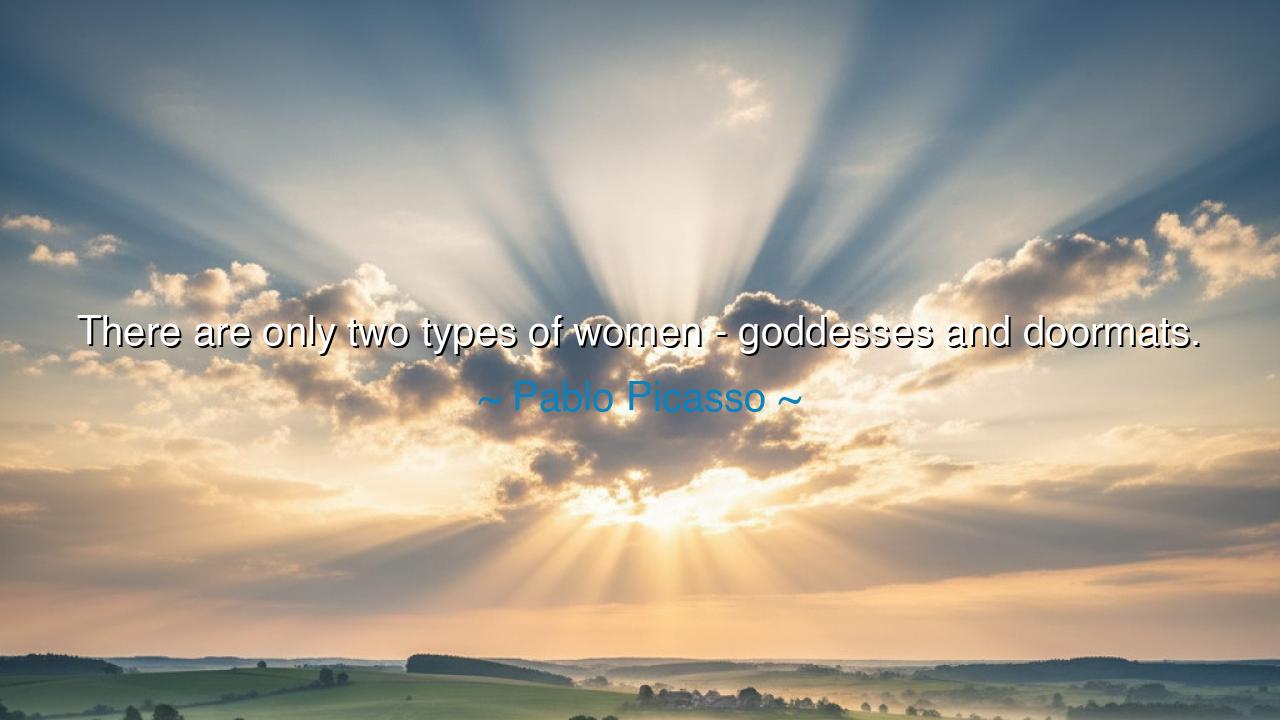
There are only two types of women - goddesses and doormats.






Pablo Picasso, painter of fractured visions and restless genius, once declared: “There are only two types of women—goddesses and doormats.” In this sharp saying we glimpse both his brilliance and his brokenness. He saw women not as a spectrum of being, but as extremes: exalted to the heavens or trampled underfoot. It is a reflection of his own tumultuous life, in which he alternately worshiped and wounded the women who stood beside him. His words are not gentle wisdom, but a confession of how passion can distort perception.
Yet, within this harshness, there is a truth about how society itself has often viewed women. For ages, women were raised high as goddesses—muses, saints, symbols of purity—or else cast low as doormats, ignored, oppressed, and denied voice. Rarely were they seen as whole, complex beings of strength and flaw alike. Picasso’s words, though spoken as jest or cynicism, shine a light on the way culture tends to define women by extremes, stripping away the humanity that lies between.
History bears witness to this. Think of Cleopatra, revered as a goddess of intellect and beauty, moving empires with her presence. She was adored and feared, placed on a pedestal of divinity. Yet in the same age, countless unnamed women toiled as servants and slaves, treated as less than human, bearing the weight of the world without recognition. This duality—exaltation for the few, degradation for the many—mirrors the cruel division Picasso spoke of.
But wisdom teaches us to look beyond the limits of his claim. Women are neither only goddesses nor only doormats; they are warriors, thinkers, builders, leaders, mothers, and dreamers. To lock them into two categories is to diminish their vastness, like trying to capture the sea in two jars. The real lesson that may be drawn from Picasso’s words is not to accept his vision, but to question it, and in questioning, to break free from it.
Let this be passed down as teaching: beware of any voice that seeks to confine women to extremes, whether of worship or of scorn. True honor is not found in making idols nor in making slaves, but in recognizing the fullness of humanity. Women, like men, are not symbols to be defined, but souls to be known. And perhaps the deepest wisdom lies in turning Picasso’s flawed utterance into a challenge—that no woman should be reduced to goddess or doormat, but seen instead as the radiant, complex being she truly is.






DCNguyen Duc Cuong
While Picasso’s quote may have been intended provocatively, it brings up uncomfortable ideas about the way women have been historically viewed. How do we confront such harmful views from famous figures, especially when their work still holds cultural significance? How do we balance the recognition of their artistic achievements with a critical examination of their personal beliefs?
QHDo Quyen Hoang
Picasso’s view seems to imply that women can only exist in two extreme states, but what about the vast middle ground? How can we move beyond these outdated stereotypes that limit women’s potential and choices? Is it time to recognize the multifaceted nature of every individual, rather than labeling them in rigid, restrictive categories?
NDNguyen Ngoc Dieu
This quote by Picasso is troubling because it oversimplifies the complexity of women’s roles and identities. How can we begin to address the harm caused by categorizing people in such binary terms? Are we still, in some ways, seeing women through this lens today, and how can we challenge these stereotypes in our daily lives?
TUPham Thu Uyen
Pablo Picasso’s quote seems to reflect a limited and harmful view of women, reducing them to two extreme categories. Is this the kind of perspective we should entertain, even in the context of art or historical figures? How does this mindset reflect the societal norms of Picasso’s time, and should we accept such views, or challenge them in the context of modern gender equality?